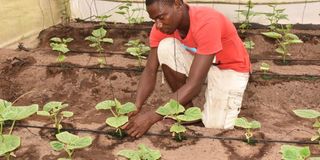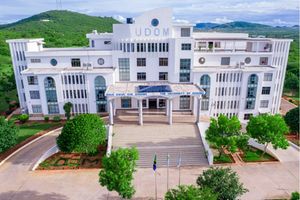Why youth must turn to farming

What you need to know:
Some stakeholders, including the Sokoine University Graduate Entrepreneurs Cooperative (Sugeco), are setting up agribusiness innovation centres to teach the youth on farming techniques, and create employment
Dar es Salaam. While farming is known to have employed about 65 percent of Tanzanians, it is a bit disturbing to learn that this crucial sector of development hasn’t attracted most youth—more so in self-employment.
Statistics show that youth constitute the largest part of Tanzania’s population. And according to the 2012 population and housing census report, at least 77 per cent of Tanzanians are under the age of 35 while 19 per cent are aged between 15 and 24.
However, youth aged between 15 and 24 which is 13.4 per cent have no jobs while women are more affected by unemployment problem by 14.3 per cent than young men with the same age (12.3 percent).
This is why the government and agriculture stakeholders are innovating ways of enabling youths to employ themselves through commercial farming.
Among the stakeholders who are laying down strategies to reverse the trend is the Sokoine University Graduate Entrepreneurs Cooperative (Sugeco) which has setup an agribusiness innovation centre that teaches youths on farming techniques to employ themselves.
Located in Mkongo Village in Rufiji District, Coast Region, the Centre has already equipped 800 youth with both agriculture and farming techniques.
Daudi Yeu of Mkongo Village is one of beneficiaries. He says he had previously employed himself as a bodaboda taxi operator until when he registered for livestock training at the centre.
“I have acquired poultry meat farming skills and we have also been trained on how to prepare poultry food and how to feed chickens. Here we have 594 three-week chickens.
“We have been trained on how to use simple methods of make chicken coops by using locally available materials like trees and grass for roofing including finding markets,” says Yeu.
The entrepreneur says he has been able to broaden knowledge and he is optimistic to make huge returns through and animal and poultry farming and agriculture.
“When I was a bodaboda taxi operator, the owner required me to submit Sh7, 000 per day. But now I have big hopes commercial farming will transform my life.
“My colleagues in the streets were surprised to learn I started training and I have decided to engage in farming.
Chipegwa Njamasi, who has been trained on the farming of greens, says, “Here I have prepared terraces on which I have planted 70 seedlings in each, so each terrace can produce 2 tonnes of vegetables.”
“I have been trained on how to prepare a farm, sow seeds, take care of a farm and drip irrigation. When I complete my training, I plan to engage in vegetable farming because I have also been trained how to find markets,” said Njamasi.
A resident of Kibaha District in Coast Region, Esther Nobert, also said she had been trained on the farming of tomatoes and lady’s fingers.
“We have been trained on how to sow seeds, weed and drip irrigation which helps preserve water that comes out in measurement. This kind of education helps us employ ourselves,” said Esther.
Kuruthum Madea from Rufiji District has been trained to grow sweet potatoes through drip irrigation.
“We have been trained to make snacks, juice and potato flour by using sweet potatoes instead of using wheat flour because demand for sweet potatoes in high than supply,” said Madea.
Sugeco Director, Revocatus Kimario the centre that was launched in 2013 by retired President Jakaya Kikwete has been able to educate 850 youth since it started offering training in 2015.
“...and today we have 58 students who will graduate. The Centre can accommodate 80 youths only if there will be enough infrastructures. However, currently it is accommodating 60 students,” said Kimario.
According to Kimario, the 58 students are from Singida, Dodoma, Morogoro and Coast regions. He says 80 percent of the students are taking up practical horticulture studies while 20 percent theoretical studies.
“The courses are offered by Sugeco in cooperation with both youth desks of the respective district councils and the Food and Agriculture Organisation (FAO),” said Kimario.
Apart from youths picked in street, the project also include graduates from Sokoine University of Agriculture (SUA), who have branded their group as ‘You Spices Enterprises’.
You Spices Enterprises have invested over Sh127.85 million in their project after taking a loan from Tanzania Agricultural Development Bank (TADB).
Speaking before the Deputy Minister for Agriculture, Omari Mgumba, who closed the training, Dickson Alex, who is the chairman of the group, said the challenge they countered was how they obtained the loan from TADB.
“The TABD considered us as prominent businesspersons while the truth is that we are just beginning to venture in business. The institution even failed to note that ours was a new project,” said Alex.
The group has cultivated 10 acres and planted vegetables since last year.
“We asked for a Sh216 loan from TABD in March 2018. They visited our project and endorsed it but we were given only Sh127 million in October 2018. This means we can’t do some of the things we planned,” he said.
He said the delay in getting the loan affected both their production calendar and loan repayments.
TADB’s official for business development, Eunice Mmbando, who attended the closing of the training shifted the blame for delay to the youth themselves for failing to attach required documents.
Sugeco boss, Mr Kimario, said one of the challenges facing the Centre was the lack of electricity, despite Mkongo Village having being electrified.
He mentioned the other challenges as a shortage of reliable water supply for crop irrigation.
“Luckily enough the Centre has over 200 acres surrounded by water including Lake Ruwe, which is situated one kilometre away from the Centre. If the lake is well used, it can be a reliable water source,” he said.
Closing a two-week training for 58 youth, Deputy Minister for Agriculture, Mr Omari Mgumba directed district councils to allocate land for youths to employ themselves in the agriculture.
Mgumba also directed the councils to set aside land for women, youth and the disabled so to fulfil the government’s resolve of offering employment to the youth.
“The councils must have agribusiness innovation centres for training youths to employ themselves. Agricultural objectives have to be more practical,” he said.
He also directed the Irrigation Commission of the Eastern zone to put irrigation scheme at Mkongo incubation centre and Coast regional administration to install electricity to the centre.
FAO’s country director, Fred Kafeero, said the project was an illustration that both the organization and the government were determined to address the problem of unemployment facing the youth.
He says FAO has supported over 17,000 youths to employ themselves in agriculture projects by offering training and providing cash capitals.
“Through proven approaches including Junior Farmer Field and Life Skills (JFFLS), we have directly built the capacity of 867 rural youth producers and reaching more than 17,340 youth operating in organized groups.
He adds: “Since 2016 to date, FAO has supported about 750 youth interventions in agriculture, more especially on practical agribusiness skills and knowledge, access to finance and markets and access to irrigation technologies including water pumps, drip irrigation kits through the Mkongo Youth Camp alone.”
Kafeero says they are working with the Ministry of Agriculture to rehabilitate the Bihawana Training Institute in Dodoma and jointly with SUA train young people in agriculture value chains.
“The youth’s population keeps rising and more challenges are emerging in the developing countries. Since there are opportunities, the youth can support the country’s economic growth even when they are living in rural areas.




